- Home
- Cynthia Hand
My Plain Jane Page 2
My Plain Jane Read online
Page 2
Until the death of Mr. Brocklehurst, that is. It had been a most fortuitous turn of events.
“The girls are beginning to theorize that it was Miss Scatcherd. What do you think?” Charlotte lifted her glasses to her eyes again to watch Jane’s face for any telltale reaction, but Jane’s expression remained completely blank.
“It wasn’t Miss Scatcherd,” Jane said matter-of-factly.
“You sound so certain,” Charlotte prodded. “How do you know?”
Jane cleared her throat delicately. “Can we talk about something else, perhaps? I’m so weary of Mr. Brocklehurst.”
How doubly suspicious that now Jane wanted to change the subject, but Charlotte obliged. “Well, I did hear a good bit of news today. Apparently the Society is coming here.”
Jane’s brow rumpled. “The Society?”
“You know, the Society. For the Relocation of Wayward Spirits. There was a ‘Royal’ in there somewhere, too, at one time, but they had to drop it on account of their falling out with the king. Which I think must be a terribly interesting story.”
Jane’s brow was still rumpled. “Well, of course I’ve heard of them. But I never—”
“Do you not believe in ghosts?” Charlotte chattered on. “I believe in ghosts. I think I may have seen one myself once, back in the cemetery at Haworth a few years ago. At least I thought I did.”
“What I’d like to know is, what do they do with them?” Jane said gravely.
“What do you mean?”
“The Society. What do they do with the ghosts they capture?”
Charlotte tilted her head to one side, thinking. “Do you know, I’ve no idea. I’ve only heard that if you’re having a problem with a ghost, you send for the Society, and they apparently all wear black masks that are quite striking, and then they come and . . .” She gestured vaguely into the air. “Poof. No more ghost. No more trouble.”
“Poof,” Jane repeated softly.
“Poof!” Charlotte clapped her hands together. “Isn’t it exciting that they’re coming?”
“They’re coming here.” Jane pressed a hand to her forehead as if she was suddenly feeling faint. Which didn’t alarm Charlotte, as young women of this time period felt faint regularly. Because corsets.
“Well, they’re not coming to Lowood, specifically,” Charlotte amended. “Apparently the Society has been hired to do some kind of exorcism on Tuesday night at the Tully Pub in Oxenhope—you know the one they say has the shrieking lady over the bar? That’s what I heard this morning from Miss Smith. But perhaps they should come to Lowood. Just think of how many girls have died here of the Graveyard Disease.” Two of those girls had been her older sisters, Maria and Elizabeth. Charlotte cleared her throat. “The school must be bustling with ghosts.”
Jane began to pace.
“We should request that they visit Lowood,” decided Charlotte. Then she had a thunderous idea. “We should ask them to solve Mr. Brocklehurst’s murder!” She paused and peered through her spectacles. “Unless there’s some reason you can think of that we wouldn’t want to solve Mr. Brocklehurst’s murder.”
Jane put a hand to her chest, as if she was now having true difficulty breathing. “How could they solve Mr. Brocklehurst’s murder?”
“They can speak to the dead, apparently. I imagine they could simply ask him.”
“I have to go.” Jane started to gather up her painting supplies, in such a hurry that she smeared paint on her dress. Then she was practically bounding up the hill in the direction of the school. Charlotte watched her go. She opened her notebook.
It’s the quiet ones who you have to watch out for, she read.
Jane Eyre had the opportunity and the motive to kill Mr. Brocklehurst, but could she have actually done it? Was she capable of cold-blooded murder for the good of the school? And if not, then why was she so agitated about the news of the Society? If not a murder, what else could Jane be hiding?
It was a mystery.
One that Charlotte Brontë intended to solve.
TWO
Jane
Jane stood across the road from the Tully Pub, her gaze fixed upon the door. The scent of pork scratchings and pickled eggs wafting from the building made her stomach cramp painfully. Her supper of a spoonful of porridge and a half glass of water were hardly adequate sustenance for a girl of eighteen. (But at least the single spoonful of porridge tasted better now that Mr. Brocklehurst was dead, she thought, which was a small comfort.)
A man came down the road. Jane checked for a mask, but he was a regular man, wearing regular clothing and walking in a regular manner. He glanced in her direction but did not notice her, and then he swung the door to the pub wide open—inside was warm firelight and more men and a burst of raucous laughter and music—and disappeared into the room, the door slamming shut behind him.
She sighed. Before she’d arrived, she had expected to see a sign across the door of the pub reading “Keep out! Exorcism of Screaming Ghost Lady, and other Regular Maintenance.” Surely a “relocation,” or whatever it was called, would be a big to-do. But she’d been standing there for nearly half an hour, and in that time men had been freely coming and going out of the pub as they would any other night. Young women like Jane didn’t belong in pubs, but she had to know if there was a ghost, and she really had to know what the Society would do to said ghost.
Jane, you see, had always believed in ghosts. When she was a small girl she’d lived with her horrible aunt Reed and two equally horrible cousins, and one night her aunt had forced Jane to sleep in the “Red Room.” (This room had red wallpaper, red curtains, and red carpets—hence the name “Red Room.”) It was creepy, and Jane had always imagined it was haunted by some shadowy, evil spirit. When Aunt Reed locked her in there, Jane tearfully begged to be let out, then screamed until she was hoarse, and finally fainted dead away—her heart, unbeknownst to Jane, actually stopped beating, so great was her terror.
She literally died of fright, if only for a moment. And when she opened her eyes again her late uncle was kneeling next to her, and he smiled at her kindly.
“Oh, good, you’re awake. I was worried,” he said.
“Uncle? How . . . are you?” She couldn’t think of anything else to say to him. She knew she was being terribly rude, since clearly her uncle wasn’t doing very well due to the fact that he’d been dead for years.
“I’ve been better,” he replied. “Can you do me a quick favor?”
In the morning, when she was finally let out of the Red Room, Jane had marched right up to her aunt and informed her that Uncle Reed was quite perturbed. He had loved Jane—and as he was dying he’d made Aunt Reed promise to take good care of her, to “love her like a daughter.” But Aunt Reed had obviously interpreted those words to mean “treat her like an indentured servant, and maybe starve her a bit for your own pleasure.” For starved Jane had been, and generally mistreated, and Uncle Reed had taken note of it all from beyond the grave, and now he demanded that Aunt Reed make amends.
“He wants you to remember your promise,” Jane explained. “He’d just like you to try to be a bit nicer.”
Aunt Reed had responded by calling Jane a “liar” and a “devil child” and sending her away to Lowood, where Mr. Brocklehurst had also labeled her a “disobedient heathen girl who was headed straight for hell.” But Jane never questioned what she’d seen. In her heart she knew that she’d really conversed with her dead uncle because it was the only moment of Jane’s rather tragic life when she’d felt that she’d been part of a real family.
She never spoke of her uncle now, of course. Not to anyone. In Jane’s experience, talking about it usually led to some form of punishment.
She stared at the tavern, her stomach grumbling loudly.
“Are you hungry, too?”
The soft voice startled her. She turned to discover a raggedly dressed little girl standing beside her. A street urchin.
“I’m hungry,” reported the child. “I’m always hungry.”
Jane glanced around. The street was deserted, save for herself and the urchin.
“I’m sorry, but I’ve nothing for you to eat,” Jane whispered.
The girl smiled. “I want to be pretty like you when I grow up.”
Jane shook her head at the wildly inaccurate compliment and turned her attention back to the pub.
“Are you going in there?” asked the girl. “I’ve heard it’s haunted.”
Yes. There was a ghost in there, and since nothing was happening outside, Jane must go in to see it. “Stay here,” she said to the urchin, and then hurried across the road. She took a deep breath and pushed through the door of the pub.
She’d done it. She’d gone inside.
The pub was packed. The scent of liquor mixed with body odor assaulted her senses. For a moment she felt paralyzed, unsure of what to do now that her waning burst of courage had propelled her into the tavern. There was no ghost that she could see. Perhaps Charlotte had been wrong.
She should ask. Of course, that would mean she would have to speak to a man. Jane had wistful fantasies about boys, but these were men. They were hairy and smelly and huge. It seemed utterly impossible to have a conversation with one of these drunken men lurching about the pub.
She did not belong here. She lowered her head, slyly pinched her nose to shut out the dreadful man smells, and barreled through the crowd toward the bar. (At least, Jane would call it barreling. We would describe it as delicately weaving.) At her approach the barkeep glanced up.
“Can I help you, miss?” he asked. “Are you lost?”
“No,” she said hoarsely. “No, at least I don’t think I’m lost. Is this the . . . establishment . . . where . . .”
“Where what?” asked the barkeep. “Speak up. I can’t hear you.”
Her corset felt horribly tight. (It was. That was rather the point of corsets.)
“Here. On the house.” The barkeep poured a glass of brandy and slid it over. For a moment Jane looked utterly scandalized that he should offer her such a thing. Then she snatched up the glass and took a sip. The liquid fire seared down her esophagus. She gasped and put the glass down. “Is this the place where the—”
She had just started to pronounce the word ghost when an unearthly shriek filled the room. Jane jerked her gaze upward to behold a woman in a white nightdress hovering in the air above the bar. The woman’s hair was raven black, floating all around her head like she was caught in an underwater current. Her skin was almost entirely translucent, but her eyes glowed like coals.
She was perhaps the most beautiful ghost Jane had ever seen. And Jane had seen her share of ghosts.
“Just ask your question, miss,” the barkeep was saying, his eyes still fixed on Jane. “I haven’t got all night, you know.”
He obviously didn’t see the ghost.
“Never mind.” Jane took another sip of the brandy and backed away from the bar to better regard the unhappy spirit.
“Where did they take him?” the ghost moaned. “Where did they take my husband?”
Jane felt a tug of pity for the woman.
“Where is he?” cried the ghost.
How awful, Jane thought, to be parted from one’s true love, to be so cruelly severed from one’s other half, like losing a part of your very soul. It was terrible. But also . . . terribly romantic.
“I know he’s here somewhere!” shrieked the ghost. “He always is. I’ve got a few things to say to him, I’ll tell you what. That good-for-nothing Billy-born-drunk!”
Oh. Oh, dear.
The ghost raised her arm and swatted at Jane’s brandy glass. It went flying, whizzing past Jane’s left ear, and crashed into the back wall.
“Cricum jiminy!” exclaimed the barkeep, because he had obviously noticed the flight of the brandy glass. “The Shrieking Lady’s back!” He glanced up at the clock on the wall. “Right on schedule.”
“Not worth a rap!” bellowed the ghost. “The boozer!” She swept around the room in a whoosh of cold wind and then back to the bar, knocking the clock off the wall for good measure. “The muck snipe!”
“Where’s the blooming Society?” the barkeep groaned. “They’re supposed to be here.”
“I know you’re hiding that ratbag!” The Shrieking Lady grabbed the bottle of brandy and lobbed it at the barkeep’s head. Her aim was true. Down he went, without another word.
This wouldn’t do at all. Jane ducked so that she would be less of a target, and crawled and slid and scurried until she was safely tucked away behind the bar, where she could use the unconscious barkeep as a shield. (Always thinking of others, that Jane.) The hem of her dress was sticking to the booze-soaked floor, which was unfortunate, but unpreventable at this point.
She peered around the incapacitated barkeep to watch the ghastly scene continue to unfold. The Shrieking Lady kept demanding to see her degenerate husband, all the while hurling things about the room. The bar patrons were cursing and bumping into one another in their haste to steer clear of the ghost, although they didn’t seem to be particularly interested in vacating the pub. They were probably used to it.
What a mess, thought Jane glumly as the Shrieking Lady sent a huge jar of pickled eggs crashing to the floor. By now she was feeling markedly less pity for the woman. This ghost is definitely troublesome, she concluded. So where was the blooming—oh dear, pardon her French—Society?
At that exact moment, as if her thoughts had conjured him, a man in a black mask jumped onto a table in the center of the room. He took a small object out of his pocket and threw it against the wall.
It exploded with a flash and a bang.
The crowd stilled. Then all faces turned to stare in open-mouthed silence at the masked man.
Jane caught herself staring, too, her breath catching—although, again, that could have just been her corset. She shoved the barkeep aside to get a better look.
The agent was a young man—even wearing the mask, that much was clear—although Jane wouldn’t call him a boy, either. Most of the men of this era had a mustache or, at the very least, sideburns, but he had neither. Jane wouldn’t call him handsome. (In the pre-Victorian age, a truly handsome man should be pale—because being out in the sun was for peasants—with a long, oval-shaped face, a narrow jaw, a small mouth, and a pointy chin. We know. We can’t believe it, either.) This young man’s jaw was decidedly square, and his hair was too long. But he was obviously of the upper class, wearing a fine wool coat and expensive-looking leather gloves.
“Everybody out!” he shouted, and Jane ducked behind the bar.
The crowd immediately exited in an orderly fashion. The room was now empty save for another masked man, this one younger than the first, definitely a boy, and wearing a much shabbier suit. Apparently they came in pairs.
The one with the exploding thing jumped down off the table.
“Now pay close attention,” he said to the second agent. “First we clear the room. Then we confirm the identity of the spirit.”
The spirit. Jane had almost forgotten. She glanced up to see the ghost. The Shrieking Lady had long since stopped shrieking, too busy staring at the agents.
The one in charge produced a small, black leather-bound notebook from an inner pocket of his coat, and a pencil. He opened the book gently, in a way that reminded Jane of Charlotte, and turned to a marked page.
“Tell me your name, spirit,” he directed at the ghost, sounding almost bored.
The Shrieking Lady pressed her back against the ceiling but refused to answer. The other agent, the short one with the mop of red hair and glasses—which Jane noticed he wore over his mask—stepped forward. “You should really answer him,” he said, looking at the ghost. “Please.”
The one in charge shushed the redhead. He turned to the ghost again. “You are Claire Doolittle, are you not?”
“I lost him,” the ghost whispered. She sounded suddenly forlorn. “They took him.”
“Took who?” The agent consulted his notebook. “You
r husband? He was thrown into debtors’ prison, if I’m not mistaken. A gambling problem.”
The ghost swayed from left to right, but said nothing.
The agent glanced down at his notebook again. “His name was Frances Doolittle.”
“Frank,” the ghost sneered. “He was a hornswoggler.”
“Frank,” said the agent, jotting that down. “Hornswoggler.” He reached into his pocket again and drew out a silver pocket watch. “All right,” he said to the second agent, “now observe this closely. When capturing a spirit—”
The ghost let out a wail so loud and so mournful that Jane’s stomach twisted with a new wave of pity. Then the Shrieking Lady snatched the watch from the agent’s grasp. At least that’s what she tried to do, but failed, as the watch passed through her insubstantial hand and clattered onto the floor.
The next events happened in quick succession:
The agent in charge reached for the pocket watch on the floor.
The ghost sensed an escape window and darted downward from the ceiling.
“She flees!” cried the redhead.
The agent in charge leapt nimbly through the air and landed beside the ghost. “Get the watch! It’s—” But he couldn’t finish the order because the redhead clumsily lunged forward and dove to tackle the ghost, but instead of tackling her, he—naturally—flew right through her and landed in a pile next to Jane’s hiding place behind the bar.
At which point Jane shot to her feet.
All eyes fell on Jane, including the ghost’s.
“Uh, good evening.” Jane waved. “I was, um . . . sleeping . . . sweeping . . . then sleeping.”
A moment of complete silence passed. Nobody moved, except the redheaded one, who groaned and rubbed his temple. But the ghost began to drift purposefully toward Jane.

 Boundless
Boundless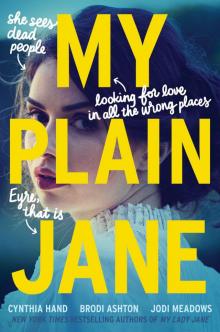 My Plain Jane
My Plain Jane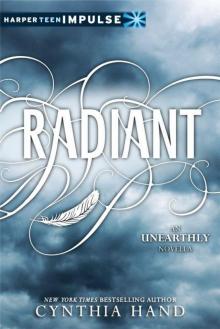 Radiant
Radiant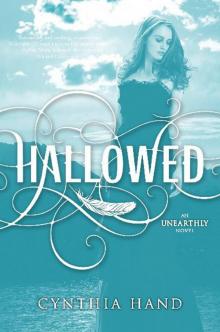 Hallowed
Hallowed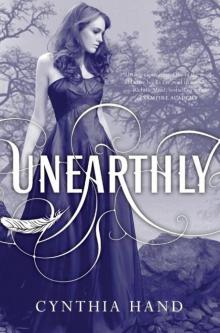 01 Unearthly
01 Unearthly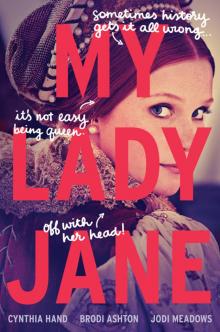 My Lady Jane
My Lady Jane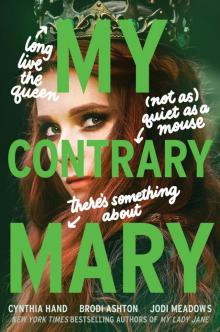 My Contrary Mary
My Contrary Mary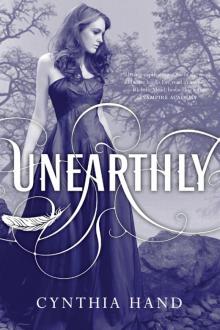 Unearthly
Unearthly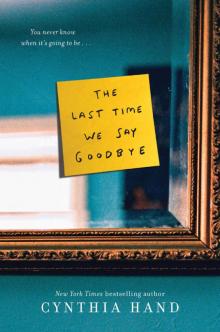 The Last Time We Say Goodbye
The Last Time We Say Goodbye The How & the Why
The How & the Why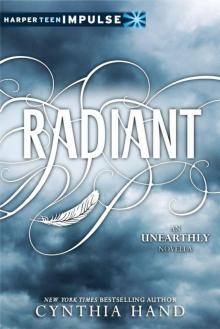 Radiant (HarperTeen Impulse)
Radiant (HarperTeen Impulse)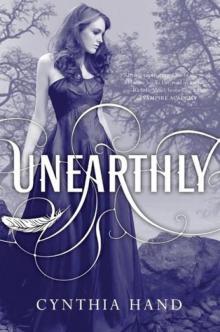 Unearthly u-1
Unearthly u-1 Boundless (Unearthly)
Boundless (Unearthly)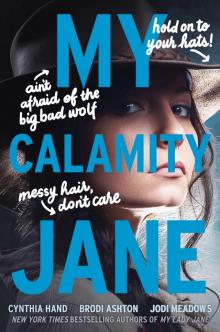 My Calamity Jane
My Calamity Jane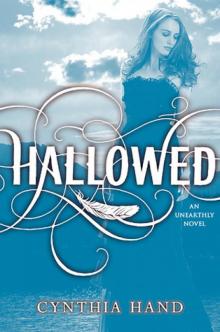 Hallowed u-2
Hallowed u-2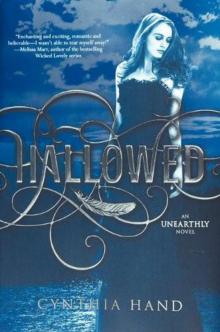 Hallowed: An Unearthly Novel
Hallowed: An Unearthly Novel